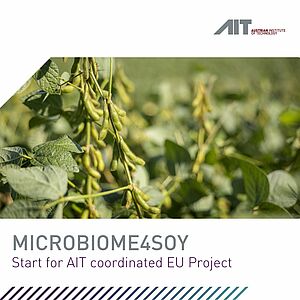The Bioresources Team of the AIT Center for Health and Bioresources is taking a leading role in the newly launched EU-funded project MICROBIOMES4SOY. This aims to promote sustainable agricultural practices and improve human health through the use of microbiomes. With a focus on the soybean as a model crop, the project aims to develop innovative microbiome-based technologies that positively impact both agriculture and human health.
Challenges of modern agriculture
The global challenges of food production and climate change require urgent solutions to promote more sustainable and environmentally friendly diets. Conventional agriculture relies heavily on chemical fertilizers and pesticides, which can have a negative impact on the environment and human health. In addition, animal protein sources are resource-intensive and contribute significantly to greenhouse gas emissions.
Microbiome-based innovations as a solution
The MICROBIOMES4SOY project addresses these challenges by exploring the role of microbiomes in agriculture and nutrition. Microbiomes are diverse communities of microorganisms found in the environment and in human bodies. The project investigates the functions and dynamics of soil- and plant-associated microbiomes in order to exploit their potential for sustainable agricultural practices. Angela Sessitsch, project coordinator and head of the AIT Bioresources group, explains: "We will use the soybean as a model plant to better understand the dynamics and functions of soil and plant microbiomes. At the same time, we are developing microbial applications that increase the stress resistance of plants and improve the nutrient quality of soybeans."
Future prospects and long-term benefits
MICROBIOMES4SOY can contribute not only to the development of more sustainable agricultural practices, but also to the promotion of healthier diets. Microbiome-based innovations can establish the soya bean as a climate-friendly protein source that has a positive impact on both human health and the environment. Beatrix Wepner, AIT Center for Innovation Systems & Policy, emphasises: "It is crucial to take a holistic approach to the food system in order to develop sustainable solutions. Microbiomes play a central role in this, as they influence soil fertility and the health of plants, animals and humans."
The project is supported by the collaboration of 17 partners from 10 countries contributing their expertise in soil, plant, human and animal microbiomes, bioinformatics, modelling, crop production, aquaculture, food and feed production, food system mapping and scientific communication.
Find out more at: microbiomes4soy.eu



